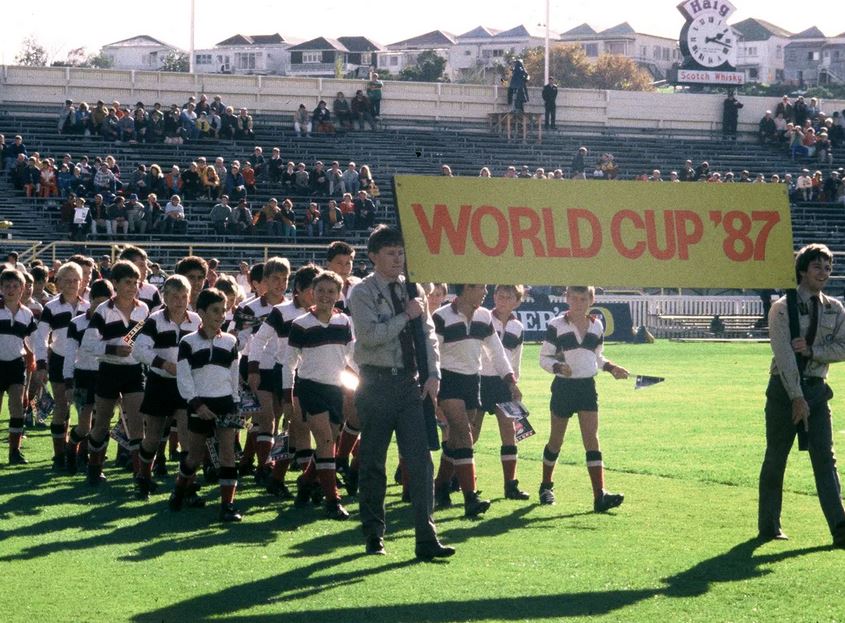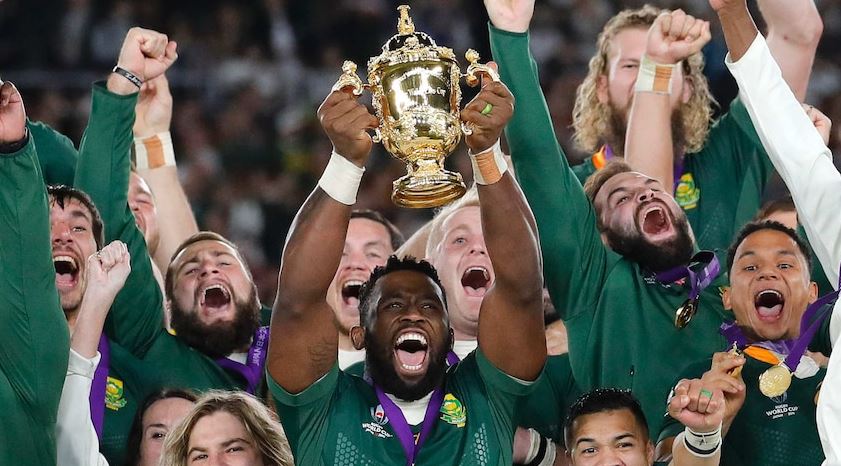Rugby is a sport that has a rich history and a devoted following. Rugby is believed to have originated in the early 19th century in England, and it has since spread around the world. The first Rugby World Cup was held in 1987, and it has since become one of the most popular sporting events in the world. The Rugby World Cup is held every four years, and it is contested by the best rugby teams from around the world. In this article, we will explore the history of the Rugby World Cup, from its inception to the present day.
The Inception of the Rugby World Cup
The idea for a Rugby World Cup was first proposed in the 1950s, but it was not until the 1980s that the idea gained serious momentum. In 1985, the International Rugby Board (now known as World Rugby) announced that they would hold the first Rugby World Cup in 1987. The decision to hold a Rugby World Cup was driven by a desire to increase the popularity of rugby, which at the time was largely confined to the amateur level.

The First Rugby World Cup: 1987
The first Rugby World Cup was held in 1987 in New Zealand and Australia. Sixteen teams competed in the tournament, and New Zealand emerged as the winners, defeating France in the final. The tournament was a great success, with more than 600,000 spectators attending the matches.
The Second Rugby World Cup: 1991
The second Rugby World Cup was held in 1991 in England, Wales, Scotland, Ireland, and France. Sixteen teams again competed in the tournament, and Australia emerged as the winners, defeating England in the final. The 1991 Rugby World Cup was notable for several reasons, including the introduction of the semi-final format, the first-ever use of a video referee, and the emergence of Jonah Lomu, a young New Zealand winger who would go on to become one of the greatest players in the history of the sport.
The Third Rugby World Cup: 1995
The third Rugby World Cup was held in 1995 in South Africa. Twenty teams competed in the tournament, and South Africa emerged as the winners, defeating New Zealand in the final. The 1995 Rugby World Cup was a significant event in the history of South Africa, as it was the first major sporting event to be held in the country following the end of apartheid. The tournament was also notable for the impact it had on Nelson Mandela, who famously donned a Springbok jersey and inspired the team to victory.
The Fourth Rugby World Cup: 1999
The fourth Rugby World Cup was held in 1999 in Wales, Scotland, and England. Twenty teams competed in the tournament, and Australia emerged as the winners, defeating France in the final. The 1999 Rugby World Cup was notable for several reasons, including the introduction of a bonus point system for scoring four or more tries in a match, the first-ever appearance of Argentina in the tournament, and the emergence of a new generation of players, including Jonny Wilkinson, who would go on to become one of the greatest players in the history of the sport.
The Fifth Rugby World Cup: 2003
The fifth Rugby World Cup was held in 2003 in Australia. Twenty teams competed in the tournament, and England emerged as the winners, defeating Australia in the final. The 2003 Rugby World Cup was notable for several reasons, including the introduction of a new qualification system that allowed smaller rugby-playing nations to qualify for the tournament, the first-ever appearance of Georgia in the tournament, and the emergence of Jonny Wilkinson as a national hero in England.
The Sixth Rugby World Cup: 2007
The sixth Rugby World Cup was held in 2007 in France. Twenty teams competed in the tournament, and South Africa emerged as the winners, defeating England in the final. The 2007 Rugby World Cup was notable for several reasons, including the introduction of a new format that saw teams divided into four pools of five teams each, with the top two teams from each pool advancing to the quarterfinals.
The tournament was also marked by several upsets, including the early exits of defending champions England and hosts France, and the emergence of Fiji as a force to be reckoned with. The Fiji team defeated Wales and Canada in the pool stage before narrowly losing to eventual winners South Africa in the quarterfinals.
The 2007 Rugby World Cup was also notable for the controversy surrounding the performance of the match officials. Several controversial decisions were made during the tournament, including a disallowed try for the All Blacks in their quarterfinal match against France, which many commentators believed had cost them the match.
Despite the controversy, the 2007 Rugby World Cup was a successful tournament, with more than 2.2 million spectators attending the matches and an estimated global television audience of 4 billion viewers.
The Seventh Rugby World Cup: 2011
The seventh Rugby World Cup was held in 2011 in New Zealand. Twenty teams competed in the tournament, and the All Blacks emerged as the winners, defeating France in the final. The 2011 Rugby World Cup was notable for several reasons, including the introduction of a new match ball, the first-ever use of the Television Match Official (TMO) in a Rugby World Cup final, and the emergence of several young stars, including New Zealand fly-half Dan Carter and Welsh fullback Leigh Halfpenny.
The tournament was also marked by a number of close matches, including a thrilling semi-final between New Zealand and Australia, which saw the All Blacks emerge as winners by just one point. The final was a closely contested match, with the All Blacks eventually prevailing by a score of 8-7.
The 2011 Rugby World Cup was also notable for the success of the smaller rugby-playing nations. Tonga and Japan both recorded historic victories in the pool stage, with Tonga defeating France and Japan defeating Canada. Fiji also performed well, narrowly losing to South Africa in the pool stage before defeating Samoa in the playoff for ninth place.
The Eighth Rugby World Cup: 2015
The eighth Rugby World Cup was held in 2015 in England. Twenty teams competed in the tournament, and the All Blacks emerged as the winners, becoming the first team to win back-to-back Rugby World Cups. The tournament was notable for several reasons, including the introduction of a new pool system that saw teams seeded based on their world rankings, and the emergence of several young stars, including Australian fly-half Bernard Foley and South African winger Cheslin Kolbe.
The tournament was also marked by several upsets, including Japan’s historic victory over South Africa in the pool stage, which many commentators described as the biggest upset in Rugby World Cup history. The Japanese team, which had been given odds of 80-1 to win the match, played a fast-paced, attacking style of rugby that left the Springboks stunned.
The 2015 Rugby World Cup was also notable for the performances of the Pacific Island teams. Fiji and Samoa both recorded victories in the pool stage, with Fiji defeating Uruguay and Samoa defeating the United States. Tonga narrowly lost to Argentina in the pool stage before defeating Namibia in their final match to finish third in their pool.

The Ninth Rugby World Cup: 2019
The 2019 Rugby World Cup was held in Japan, marking the first time the tournament was held in Asia. Twenty teams participated in the tournament, with South Africa emerging as the champions after defeating England 32-12 in the final.
The tournament was notable for several reasons, including the performance of the host nation, Japan. The Japanese team, coached by Jamie Joseph, played a fast-paced, attacking style of rugby that captured the attention of fans around the world. They won all of their pool matches, including a historic victory over Scotland that secured their place in the quarterfinals for the first time in their history. Although they were eventually knocked out of the tournament by South Africa in the quarterfinals, their performances earned them widespread praise and respect.
The 2019 Rugby World Cup was also notable for the early exits of several high-profile teams, including Ireland, Scotland, and Wales. New Zealand, the defending champions and one of the tournament favorites, were also knocked out in the semifinals by England, who went on to face South Africa in the final.
The final itself was a one-sided affair, with South Africa dominating England in all aspects of the game. The Springboks scored two tries and kicked six penalties to secure a comfortable victory and their third Rugby World Cup title. The victory was particularly significant for South Africa, as it came 24 years after their first Rugby World Cup triumph in 1995, which was also held in Japan.
The 2019 Rugby World Cup was also notable for the introduction of several new rules and regulations aimed at improving player safety and reducing the number of high tackles and head injuries. These included the introduction of a high tackle warning system, which saw players receive a yellow card if they were deemed to have made a high tackle, and the adoption of stricter guidelines for the use of the Television Match Official (TMO) to review incidents on the field.
Overall, the 2019 Rugby World Cup was considered a successful tournament, with more than 1.7 million spectators attending the matches and an estimated global television audience of 857 million viewers. It showcased the best of rugby on the world stage and demonstrated the growing popularity of the sport in Asia.
The Tenth Rugby World Cup: 2023
The 2023 Rugby World Cup is scheduled to be held in France from September 8 to October 28, 2023. This will be the tenth edition of the tournament and the second time that France has hosted the event, having previously done so in 2007.
Twenty teams will participate in the tournament, which will feature 48 matches played across 10 venues throughout France. The tournament will kick off with an opening match at the Stade de France in Saint-Denis, with the final to be held at the same venue.
The format of the tournament will remain largely unchanged from previous editions, with the teams divided into four pools of five teams each. Each team will play four pool matches, with the top two teams from each pool advancing to the quarterfinals.
France, as the host nation, automatically qualifies for the tournament, as do the top three teams from each pool in the 2019 Rugby World Cup – South Africa, England, Wales, and New Zealand. The remaining 12 teams will qualify through a series of regional qualification tournaments, which are currently ongoing.
The 2023 Rugby World Cup is expected to be a major sporting event, with hundreds of thousands of fans from around the world expected to attend. The tournament will also have significant economic benefits for France, with estimates suggesting that it could generate more than €1 billion in revenue and create thousands of jobs.
The organizers of the tournament have also announced a number of initiatives aimed at promoting sustainability and reducing the tournament’s environmental impact. These include the use of renewable energy sources, the promotion of sustainable transportation options for fans and visitors, and a commitment to reducing waste and promoting recycling.
Overall, the 2023 Rugby World Cup promises to be a major event for rugby fans around the world, with some of the best teams and players competing on the global stage in one of the sport’s most historic and passionate nations.